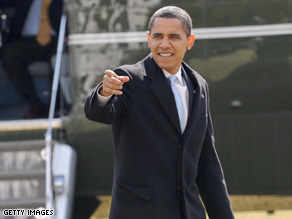
President Obama will pitch his plans this week for dealing with record home foreclosures and trying to thaw frozen credit markets — and taking some key lessons learned into consideration.
Aides said the White House has learned several lessons from the fight over the economic stimulus plan, including that the president is better at selling his ideas when he gets out of Washington. “He has learned, over the course of the last few weeks, getting out to the country, getting the people to remember why they elected him, and I think he’s going to continue to take the case directly to the American people,” said CNN contributor Hilary Rosen. A second lesson was articulated to a handful of newspaper columnists, including E.J. Dionne of The Washington Post, who were invited aboard Air Force One on Friday. The president suggested he will no longer let bipartisanship become the barometer of his success, telling the columnist: “You know, I am an eternal optimist. That doesn’t mean I’m a sap.” Dionne said, “By talking so much about bipartisanship, he allowed others to judge him by how much Republican support he got. He wants to get things done with or without Republican votes, preferably with them. But he will be happy if he just gets it through.”
Don’t Miss
CNN/Money: Stimulus: Now for the hard part
Obama looks to mortgage rescue
California budget crisis jeopardizes 20,000 jobs
States to face $300 billion shortfall, Congress told
Lesson three: The president faced all kinds of criticism for the meandering nature of the stimulus negotiations. In the end, he won anyway. Obama said that “he wants to be pragmatic without being unprincipled. There are things he wants to get done,” Dionne said. “He’s much more concerned about where he’s going than the road there. If the road is a little crooked, but it gets you there, that’s better than not getting there at all.” Lesson four: It may have been a mistake for the president to give Republicans large tax cuts early in the stimulus talks. In his first presidential press conference, Obama suggested he would take a harder line with Republicans in future negotiations. “I mean, I suppose what I could have done is started off with no tax cuts, knowing that I was going to want some, and then let them take credit for all of them, and maybe that’s the lesson I learned. But there was consultation; there will continue to be consultation,” Obama said. For the rest of the month, the White House agenda will focus on addressing the housing crisis — including a stop Wednesday in Phoenix, Arizona — as well as cleaning up the banking mess and laying the groundwork for the overhaul of the health care system and entitlement programs such as Medicare. Watch more on Obama’s coming agenda »
The following week, the president will host what the White House is billing as a “fiscal responsibility” summit. The goal of Monday’s summit is to begin weighing the impact of massive federal programs such as Social Security and Medicare days before the president plans to unveil his first annual budget to congressional leaders. Then on February 24, the president will deliver his first speech to a joint session of Congress. Top aides said foreign policy could be addressed briefly, but the speech will focus heavily on the economy and the domestic agenda.